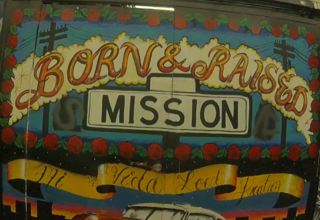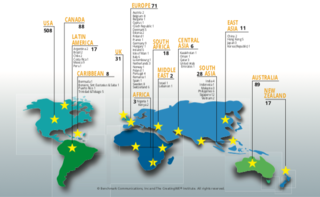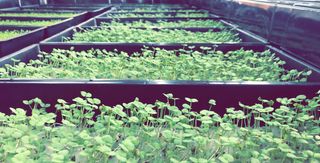
Intelligence
Smart Cities
What do C-IQ, Co-creation, and microgreens have in common?
Posted August 30, 2019
by Nicklas Balboa and Richard D. Glaser, Ph.D.
As cities develop, they create a name for themselves; the Golden Gate City (San Francisco), the Windy City (Chicago) the Big Apple (New York City), The City of Angels (Los Angeles) and my personal favorite, the Emerald City (Seattle). These names reflect a part of the identity that separates the city from others and makes them unique.

Although much of a city’s structure is dictated by government, the soul of the city is created by the local art, religion, politics, and idiosyncrasies that shape local culture. For example, if you take the Highway 101 into the Golden Gate City you will see an explosion of color on the walls of buildings. San Francisco is known for its eclectic architecture, tasty food, Street Art, Jazz, and a multi-cultural melting pot of folks from every part of the world. Most famous is the Mission District, which houses some of the most beautiful Latino murals, foods, music, barrios and people.
The Rise of Co-creation
Native communities are the ones most affected by the influx of corporate life, often finding themselves pushed out of their childhood neighborhoods in lieu of new offices or apartment complexes, which are unaffordable unless you take a job at a local corporation. Conversational Intelligence® is a methodology that can facilitate conversations between communities and their respective governments by generating awareness and providing a framework for people to connect, navigate, and grow together.

Conversational Intelligence® (C-IQ) is spreading across the globe as coaches in seventy-five countries introduce the methodology to families, governments, schools, and businesses. If cities wish to keep their identities, then city leaders need to create more ‘generative’ conversations about how cities and corporations can co-create the future to include native communities.
As conversations about the future of city growth and expansion include more native people, there will be a positive impact on the identity of the cities themselves. Civic leaders are seeing the rise of cities that maintain the City’s integrity and belief in itself. They are seeing people begin to ask “what are the ‘aspirations of our cities’, and they are looking to think in a more connected way about their cities.
These cities are transforming their identities and it is happening right before our eyes. Cities like Denver and San Francisco are trend setters and have radically changed what is accessible to the public (from cannabis to same-sex marriage) and are redefining modern culture. What identity is your city assimilating?
A Greener Future
If you take a trip to the Emerald City you won’t find any jewels, but rather a lush green landscape that is loved, protected, and evangelized by the local, yet urban community. This pro-ecology city is one of the most progressive in terms of facets like urban farming, a growing trend in agriculture that could potentially provide people anywhere in the US with clean, freshly grown, carbon neutral food. Urban farms in Seattle integrate gardens into apartments, local shops, greenhouses, and even broken-down cars!
Food culture is on the rise again in America and people want to know where their food comes from, how it was raised, and what was put in it. As obesity, mental health illness, and cardiovascular disease continue to rise in our country more people will seek natural and organic foods as a way to reverse this trend. How can we get clean food into cities without disrupting the modern lifestyle? Turn to urban farming.

Urban farming could be coming to a city near you if it has not already. An urban farm is an integrative approach to cultivating food in urban areas that increases food security, makes efficient use of land, creates a communal sense of belonging and is quite a learning experience. My fiancé and I work at X-St Farms, one of San Francisco’s modern urban farming projects that produces clean and sustainable food. We grow over 30 types of microgreens like cilantro, basil, benitade, sunflower, sugar pea, sorrel, and shiso.
Learning to grow your own food creates an appreciation for the immense amounts of work it takes to feed any population of people. This is why we have cheap alternatives like fast food and processed foods at grocery marts, because growing natural, clean food is traditionally a difficult process. Urban farms turn ordinary spaces into lush, green, edible gardens that bring people together for the love of good food, something we all want and need.
Projects like these bring local people together and bolster a community with the added bonus of bringing us back to our natural roots. Access and exposure to green space can also positively impact your health! Instead of spending days sitting and staring at a screen, urban farmers are walking, cutting, planting, and watering in a lush, green environment. This dynamic coupling of exercise and green space can relieve stress and reduce depression while promoting patience and creativity.
So if you are in need of good food, social support and exercise, perhaps you can talk to your city leaders about starting an urban farm in your community.
Future Aspirations
The Smart City is built on feedback between the government and the local population. The wants, needs, and aspirations of local communities depend on the listening abilities of the government. By co-creating a roadmap of the city’s future aspirations, leaders can connect with and align their values with those of the local community.
“In the past, the government has been traditionally built as separate entities with specific specialization. Through the rise of Conversational Intelligence® in projects like Smart Cities, and in the increase in the interconnectivity of stakeholders from government to business, from local to global, we can see people breaking down walls, listening to connect, asking questions that are bigger than they have ever asked before, and seeing extraordinary ways to enhance not only our cities, but to also enhance our planet! “ —Judith E. Glaser
Reach us here for any inquiries on Conversational Intelligence®.



